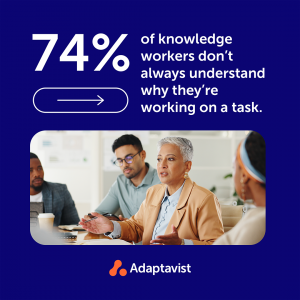Over 40% of knowledge workers experienced emotional withdrawal and reduced motivation in the last 12 months
LONDON, UNITED KINGDOM, September 17, 2025 /EINPresswire.com/ -- Employee morale is quietly collapsing across global workplaces, according to new research from digital transformation consultancy Adaptavist. The study of 4,000 knowledge workers in the UK, US, Canada, and Germany, conducted by Attest, found that more than four in 10 knowledge workers report reduced motivation (42%), admit to feeling unappreciated by managers (41%), and say they’ve experienced emotional withdrawal (40%) over the last 12 months.
The phenomenon, dubbed ‘quiet cracking’, is
growing at an alarming scale, according to Adaptavist, with almost half (47%) of respondents experiencing changes in performance or focus over the last 12 months.Adaptavist’s findings point to several contributing factors, including feelings of hopelessness about career advancement (38%), fears around job security (38%), reduced communication with colleagues (37%), and a loss of confidence (32%).
The survey also reveals some of the biggest drivers behind these feelings of disengagement:
- Lack of clarity - nearly three-quarters (74%) admit they don’t always understand the ‘why’ behind workplace tasks.
- Corporate jargon - 74% say corporate buzzwords such as ‘KPIs’, ‘efficiency’, and ‘action items’ make them disengage, with 39% frustrated by jargon several times a week.
- Technostress - 27% regularly feel overwhelmed by ‘digital noise,’ and a significant 67% experiencing it some of the time, with those impacted much more likely to view technology as negatively impacting their mental health, anxiety, and stress.
The power of understanding ‘why’
Severance, the popular Apple TV show which premiered its second season this year, presented a dystopian view of the drawbacks of not understanding the 'why' behind work tasks. Adaptavist's research shows that these ideas aren't a million miles away from the truth, as workers who always understand the ‘why’ behind their assigned tasks are less likely to experience the symptoms of quiet cracking than those who don’t.
For example:
- Just 23% of those who said they always understand the ‘why’ behind tasks report reduced confidence, compared to 35% who don’t understand the 'why'.
- 32% who understand the ‘why’ report emotional withdrawal, compared to 43% who don’t understand the 'why'.
- 30% (vs 40%) report feeling hopelessness about growth or career progression.
- 30% (vs 41%) report fears around job security.
- 31% (vs 45%) report reduced motivation.
What’s more, those who understand the ‘why’ behind their tasks are also less likely to suffer from technology-related stress or anxiety at work than those who don’t, proving to be more resilient and successful with technology. In fact, they are more than twice as likely (61% vs 29%) to say they feel energised and motivated by their work environment.
Additionally, those who understand the purpose of their workplace tasks are more than twice as likely (46% vs 19%) to say corporate jargon or business-speak never causes them to mentally disengage or become less productive at work. They are also twice as likely (51% vs 25%) to say tech has significantly helped their career advancement. These findings make clear that tech is an amplifier for your organisational foundations, for better or for worse.
Younger workers, however, are disproportionately less likely to feel these benefits: a third (34%) of 18-24 year olds say they only ‘sometimes’ or ‘rarely’ understand why they're doing tasks at work - higher than the overall average of 25%, and significantly higher than those in the 55+ age category (17%). As the rise of AI fuels speculation about how junior talent is supported and developed, these latest findings speak to a different cultural challenge: younger workers are struggling to understand the rationale behind their work.
Neal Riley, Innovation Lead at The Adaptavist Group, comments: “Leaders can no longer afford to ignore the cracks in workplace engagement, and evidently, employees need clarity and purpose, not buzzwords. With over a quarter of workers overwhelmed by digital noise, it’s clear that teams need tools that support effective collaboration, purposeful communication, and which don’t exacerbate stress and workloads. Our findings underscore the critical importance of articulating the ‘why,’ pinning strategy to execution, and aligning teams around shared outcomes to both protect morale and boost performance.”



No comments:
Post a Comment